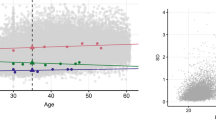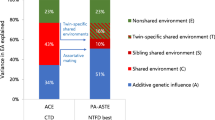Abstract
THE use of kinship correlations is a long established approach to the estimation of heritabilities (h2) and component variances of human phenotypes. Among the best known studies are those using monozygotic and dizygotic twin correlations, data from which are commonly interpreted to represent a substantial heritability (that is, about 0.8) of IQ and other mental test performances (see Jensen1 for review, and Jinks and Fulker2 for the empirical requirements of this approach). Some doubt has been cast, however, over the empirical sufficiency of the most quoted estimates. Among the doubts are those concerning biographies of subjects, testing procedures, and problems emerging from the use of varied and inappropriate tests and from the subjects being of widely different ages3. More recent estimates using a version of the identical–fraternal twin comparisons (but derived from a sample in which the zygosities were unknown) have arrived at a value for h2 not significantly different from zero4–6. The National Child Development Study (for details, see ref. 7), a longitudinal study of all the children in England, Scotland and Wales born in one week of March 1958, includes a nationally representative sample of twins about whom have been gathered considerable biographic, biometric, social and psychometric data (unpublished results). We have used this sample to investigate the broad heritability of performance on a general mental ability test.
This is a preview of subscription content, access via your institution
Access options
Subscribe to this journal
Receive 51 print issues and online access
$199.00 per year
only $3.90 per issue
Buy this article
- Purchase on Springer Link
- Instant access to full article PDF
Prices may be subject to local taxes which are calculated during checkout
Similar content being viewed by others
References
Jensen, A. R., Harv. Educ. Rev., 39, 1 (1969).
Jinks, J. L., and Fulker, D. W., Psychol. Bull, 73, 311 (1970).
Kamin, L., The Science and Politics of IQ (Wiley, London, 1975).
Scarr-Salapatek, S., Science, 174, 1285 (1971).
Schwartz, M., and Schwartz, J., Nature, 248, 84 (1974).
Schwartz, M., and Schwartz, J., Psychol. Bull. (in the press).
Davie, R., et al., From Birth to Seven (Longman, London, 1972).
Cederlof, R., et al., Acta Genet Basel., 11, 338 (1961).
Cohen, D. J., et al., Arch. gen. Psych., 29, 465 (1973).
Bulmer, H. G., The Biology of Twinning (Clarendon, Oxford, 1970).
Douglas, J. W. B., The Home and the School (MacGibbon and Kee, London, 1964).
Jensen, A. R., Proc. natn. Acad. Sci. U.S.A., 58, 149 (1967).
Eaves, L. J., and Jinks, J. L., Nature, 240, 84 (1972).
Lewontin, R. C., Am. J. Hum. Genet., 26, 400 (1974).
Author information
Authors and Affiliations
Rights and permissions
About this article
Cite this article
ADAMS, B., GHODSIAN, M. & RICHARDSON, K. Evidence for a low upper limit of heritability of mental test performance in a national sample of twins. Nature 263, 314–316 (1976). https://doi.org/10.1038/263314a0
Received:
Accepted:
Issue Date:
DOI: https://doi.org/10.1038/263314a0
This article is cited by
-
The power of the classical twin study
Heredity (1978)
-
Estimation of heritability from IQ data on twins
Nature (1977)
-
Estimation of heritability from IQ data on twins
Nature (1977)
-
Estimation of heritability from IQ data on twins
Nature (1977)
-
Estimation of heritability from IQ data on twins
Nature (1977)
Comments
By submitting a comment you agree to abide by our Terms and Community Guidelines. If you find something abusive or that does not comply with our terms or guidelines please flag it as inappropriate.



